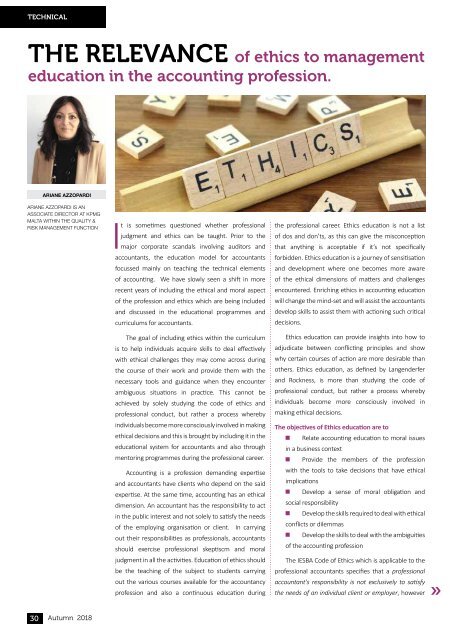THE ACCOUNTANT_AUTUMN_2018_VER-7-L
Create successful ePaper yourself
Turn your PDF publications into a flip-book with our unique Google optimized e-Paper software.
TECHNICAL<br />
<strong>THE</strong> RELEVANCE of ethics to management<br />
education in the accounting profession.<br />
ARIANE AZZOPARDI<br />
ARIANE AZZOPARDI IS AN<br />
ASSOCIATE DIRECTOR AT KPMG<br />
MALTA WITHIN <strong>THE</strong> QUALITY &<br />
RISK MANAGEMENT FUNCTION<br />
It is sometimes questioned whether professional<br />
judgment and ethics can be taught. Prior to the<br />
major corporate scandals involving auditors and<br />
accountants, the education model for accountants<br />
focussed mainly on teaching the technical elements<br />
of accounting. We have slowly seen a shift in more<br />
recent years of including the ethical and moral aspect<br />
of the profession and ethics which are being included<br />
and discussed in the educational programmes and<br />
curriculums for accountants.<br />
The goal of including ethics within the curriculum<br />
is to help individuals acquire skills to deal effectively<br />
with ethical challenges they may come across during<br />
the course of their work and provide them with the<br />
necessary tools and guidance when they encounter<br />
ambiguous situations in practice. This cannot be<br />
achieved by solely studying the code of ethics and<br />
professional conduct, but rather a process whereby<br />
individuals become more consciously involved in making<br />
ethical decisions and this is brought by including it in the<br />
educational system for accountants and also through<br />
mentoring programmes during the professional career.<br />
Accounting is a profession demanding expertise<br />
and accountants have clients who depend on the said<br />
expertise. At the same time, accounting has an ethical<br />
dimension. An accountant has the responsibility to act<br />
in the public interest and not solely to satisfy the needs<br />
of the employing organisation or client. In carrying<br />
out their responsibilities as professionals, accountants<br />
should exercise professional skeptiscm and moral<br />
judgment in all the activities. Education of ethics should<br />
be the teaching of the subject to students carrying<br />
out the various courses available for the accountancy<br />
profession and also a continuous education during<br />
the professional career. Ethics education is not a list<br />
of dos and don’ts, as this can give the misconception<br />
that anything is acceptable if it’s not specifically<br />
forbidden. Ethics education is a journey of sensitisation<br />
and development where one becomes more aware<br />
of the ethical dimensions of matters and challenges<br />
encountered. Enriching ethics in accounting education<br />
will change the mind-set and will assist the accountants<br />
develop skills to assist them with actioning such critical<br />
decisions.<br />
Ethics education can provide insights into how to<br />
adjudicate between conflicting principles and show<br />
why certain courses of action are more desirable than<br />
others. Ethics education, as defined by Langenderfer<br />
and Rockness, is more than studying the code of<br />
professional conduct, but rather a process whereby<br />
individuals become more consciously involved in<br />
making ethical decisions.<br />
The objectives of Ethics education are to<br />
• Relate accounting education to moral issues<br />
in a business context<br />
• Provide the members of the profession<br />
with the tools to take decisions that have ethical<br />
implications<br />
• Develop a sense of moral obligation and<br />
social responsibility<br />
• Develop the skills required to deal with ethical<br />
conflicts or dilemmas<br />
• Develop the skills to deal with the ambiguities<br />
of the accounting profession<br />
The IESBA Code of Ethics which is applicable to the<br />
professional accountants specifies that a professional<br />
accountant's responsibility is not exclusively to satisfy<br />
the needs of an individual client or employer, however<br />
30 Autumn <strong>2018</strong>
















